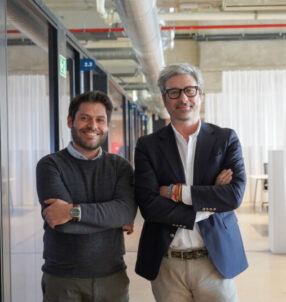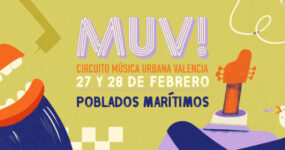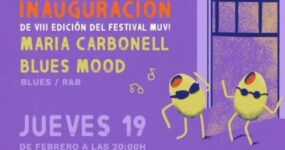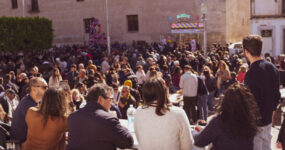Fireworks in Valencia
Valencians take their fireworks very seriously. There can’t be many places in the world where a Castillo or firework display will be angrily booed and slow hand clapped if it’s deemed to be too monotonous or, the ultimate sin in these parts, not punctuated by enough loud bangs. Pyrotechnicians are held in high esteem and the most famous like the Caballer family enjoy superstar status.
From the first of March people go religiously to each daily Mascletá and it’s this event which excites the most passion amongst Valencians. Every Mascletà is broadcast live on TV simultaneously on two different channels ! (Just in case you want to avoid perennial Fallas presenter Julio Tormo). Valencians who can’t make it to the town square watch with the volume turned right up for maximum effect. Whereas you or I might reasonably think that one load of loud bangs is much the same as another, every Valencian is a passionate and discerning critic. They will quickly put you right about the symphony of sound, the smell of cordite and the apocalyptic rush of the finale (often from the safe distance of their weekend chalet in the mountains where they’ve just nipped off for a few days to get away from the Fallas crowds). There are even those who video the Mascletá, keeping the best ones for future viewing. A web site exists where people can grade each boomfest on a scale of 1 to 10, during Fallas the site has more than 5,000 hits a day.
There’s a certain etiquette associated with the daily Mascletá ritual, for the younger Valencian whizz bang watcher. For example, attendance of the Mascletá complete with moped, the latest sunglasses and a packet of Fortuna are de rigeur , those who say it’s just an excuse for them to bunk off classes are just not getting into the spirit of things. After a good Mascletá people will show their appreciation by spontaneously rushing over to the security fence to acclaim the triumphant pyrotechnician. When it’s really good, the bloke who’s just let off all the bangers is held aloft on the shoulders of the adoring masses and paraded round or even invited up to the Town Hall balcony to milk the applause of the crowd. Only in Valencia can you command the adoration usually reserved for footballers and film stars for, let’s face it, making a series of really loud noises with a load of gunpowder. But then, of course, there’s much more to it than that and anyone who’s witnessed the sheer energy and excitement of 120 kilograms of explosives being let off in a relatively closed space on a sunny early Spring afternoon will understand why.
Some of these people even have their own fan clubs. A quick look at the Caballer family fan club website reveals the extent of fervent hero worship they can inspire. Cynics may think all this is a bit over the top but just like the English are obsessed with the right amount of milk in their tea, the quality of their television and (at least every four years) the ability to accurately slide large round plastic weights along some ice, for some people bangers and rockets are really important. Like Jesus from Algete who coos, “You’re by far the best Pyrotechnicians in the world and I treasure my large collection of videos of your work” while Juancar from Godella urges them to “stay true to your Valencian values don’t be swayed by international trends and stick to your heroic mission to Valencianize the firework world”. It’s not all praise though, Alberto from Quart de Poblet remarks “the 2004 Nit de Foc was far superior to your efforts in 2005 but I don’t think anyone could ever improve on that wonderful night back in 2001”. On second thoughts, this may be going a bit too far.
In overalls and sweating (presumably from the intense ten minutes of running around through a load of air bombs with a lighter), the “pirotecnics” enjoy a sort of Fred Dibnah heroic working men of the people image, but Valencian firework making and pyrotechnics is a 30 million euro a year business, by far the biggest in Europe. Firework factories and warehouses are dotted around the Valencian countryside near outlying villages and towns. It’s not at all uncommon for the peace of a quiet orange grove to be suddenly shattered by the boom from somebody testing out a new type of rocket or Tron de bac. The industry is not without its risks and as more experimentation takes place here than any where else in Europe it has often been marred by tragedy. There have been 25 deaths from accidents in Valencian firework factories just in the last ten years.
The industry is still largely the domain of fiercely independent family run businesses and one dynasty in particular the Caballer family is the quintessential Borgias of the boom and bang. On the last three (and most important) days of this year’s Fallas all but one of the principal Fireworks displays, including Mascletás, Castillos and the Nit de Foc will be organised by one Caballer family member or another. Vicente and Jose Caballer started the company back in 1881, which has spawned four different companies each one headed by a different member of the family and each claiming to be the original. Other firework families like the Brunchu and the Zamorano are connected to the dynasty by marriage to Josefina and Leonor Caballer, the first women pirotecnics at the turn of the century. The Caballers are contracted for firework displays all over the world, including the closing ceremony of the Athens and Sydney Olympics, the Rolling stones Voodoo lounge tour and New year’s eve celebrations in London and New York but they consider the Nit de Foc and the Plaza del Ayuntamiento as their Cup final where they are judged by their own knowledgeable crowd.
So get down early to the Mascletá for a good spec in front of the post office (the smoke always blows the other way) and, most important of all, make sure you’re not wearing last year’s sunglasses.
David “ninot” Rhead y José “indultat” Marín

























